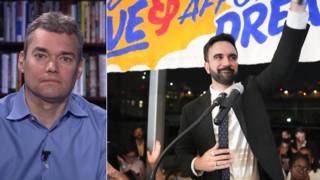
Topics
Guests
- Roberto LovatoNew York-based writer with New America Media and a frequent contributor to The Nation magazine.
After Senate Republicans blocked passage of the DREAM Act, a provision that would grant undocumented young people a chance at citizenship, many immigrant rights advocates are openly questioning the Obama administration’s immigration strategy. Over the past two years, the Obama administration has deported a record number of undocumented immigrants but failed to gain support from Republicans on any immigration reform legislation. We speak with writer Roberto Lovato. [includes rush transcript]
Transcript
JUAN GONZALEZ: We turn now to the next steps for the immigrant rights movement following a disappointing week on Capitol Hill. On Saturday, Senate Republicans blocked passage of the DREAM Act, a provision that would grant undocumented young people a chance at citizenship. Under the measure, immigrant youth would obtain permanent residency with a chance for citizenship, provided they attend college for at least two years or enlist in the military. The Republican filibuster was a devastating blow for the student-led movement that has pushed for the DREAM Act’s passage over the past decade.
At his White House news conference on Wednesday, President Obama called the DREAM Act’s defeat his “biggest disappointment.”
PRESIDENT BARACK OBAMA: Maybe my biggest disappointment was this DREAM Act vote. You know, I get letters from kids all across the country, who came here when they were five, came here when they were eight. Their parents were undocumented. The kids didn’t know. Kids are going to school like any other American kid. They’re growing up. They’re playing football. They’re going to class. They’re dreaming about college. And suddenly, they come to 18, 19 years old, and they realize, “Even though I feel American, I am an American, the law doesn’t recognize me as an American. I’m willing to serve my country. I’m willing to fight for this country. I want to go to college and better myself. And I’m at risk of deportation.” And it is heartbreaking.
JUAN GONZALEZ: The Obama administration says it will try to mobilize public support for the DREAM Act’s passage next year. Speaking to reporters, White House Communications Director Dan Pfeiffer said Obama will “wage a very public campaign” for the DREAM Act next year. But the bill’s defeat this week has led many immigrant rights advocates to openly question the Obama administration’s immigration strategy. Over the past two years, the administration has deported a record number of undocumented immigrants but failed to gain support from Republicans on any immigration reform legislation.
AMY GOODMAN: Well, to talk about all of this and where does the immigrants’ rights movement go next, we’re joined by Roberto Lovato, writer with New America Media, frequent contributor to The Nation and the Huffington Post, previously executive director of the Central American Resource Center, then the country’s largest immigrant rights organization, has now just moved to San Francisco.
Roberto, welcome. Where does the immigrant rights movement go from here?
ROBERTO LOVATO: Hi, Amy, Juan.
I think the immigrant rights movement needs to look to what worked around the vote on the DREAM Act, which was the dreamers themselves. In the face of the nightmare of immigration enforcement that the Obama administration has rained upon immigrants — record-breaking deportations, detentions, persecutions, prosecutions, record-breaking amount of terror among children and elderly and families, separation of families — the young dreamers have taken a largely zombie and dead immigrant rights movement that was focused on something called comprehensive immigration reform and pushed people that were actually opposed to the DREAM Act or didn’t do anything about it, groups in Washington, D.C. that are allied to the Democrats, and forced them to the point where they almost got it at five votes — five, actually, votes, which is the same amount of Democrats that didn’t support the law.
So, the movement needs to be very clear that the commander-in-chief of the war on immigrants is not Joe Arpaio or Janice Brewer in Arizona, it’s Barack Obama in Washington, D.C. And so, the degree to which the movement starts seeing itself as separate from and pressuring the Obama administration on enforcement, because, you know, people are being terrorized, is the degree to which that movement will start changing, rather than be subsumed and subjected to the manipulations of groups in Washington, D.C. that basically will refuse to criticize Obama and actually applaud him for his support of the DREAM Act while being silent about that record deportation and terror that he’s foisting.
JUAN GONZALEZ: Well, Roberto, but what about that, I guess, internal battle that must be waged within the immigrant rights movement, because obviously many of the national immigrant rights organizations, the churches, organizations that have supported the movement, some of the trade unions, are less willing to directly challenge the President or the Democratic leadership in Congress on how hard to push immigration reform?
ROBERTO LOVATO: Yeah, that is the discussion that has to be — take place, if the movement is to move out of what I would call, and many of us are calling, the humiliated position, in which we’ll basically take anything as long as you give us something, OK? There’s studies out of University of Syracuse and others, even today’s Washington Post, show how there’s been a systematic increase in the amount of repression against immigrants, basically, through programs like Secure Communities, record-breaking repression. Now, if you look at the press releases coming out of groups like Center for Community Change, the National Council of La Raza, America’s Voice, National Immigration Forum, they will be mum or very tepid about criticizing Obama but lauding him for his leadership on the DREAM and support for comprehensive immigration reform, which is a zombie that they trot out when the Democrats need votes. So, there’s this healthy discussion and debate in the movement right now to really, really put pressure on these groups in Washington, D.C., question them, their funders, and the Obama administration for the absolute failure of comprehensive immigration reform and the precarious position it’s put millions of people in in the United States. I mean, you know, you just have to step outside of your television set into the community and listen to people, and the disappointment and disillusion and terror that people are dealing with right now.
AMY GOODMAN: Roberto Lovato, we want to thank you for being with us. We will certainly continue to follow this issue. Roberto Lovato is founder of Presente.org.













Media Options